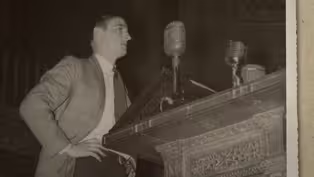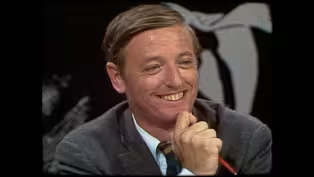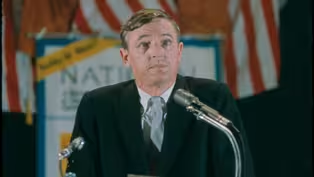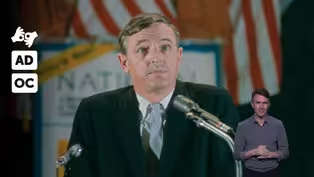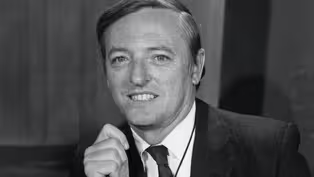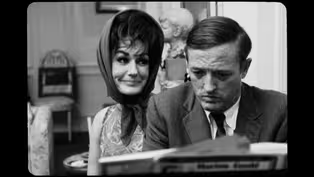
5 Firing Line moments that are still relevant today
Clip: 4/5/2024 | 15m 34sVideo has Closed Captions
This Firing Line compliation shows Buckley in conversation with five of his most memorable guests.
William F. Buckley, Jr. hosted Firing Line for 33 years. During his tenure as host, he debated a number of influential public figures on topics ranging from comedy to imperialism. This compliation shows Buckley in conversation with five of his most memorable guests on matters that are still important today.
Problems playing video? | Closed Captioning Feedback
Problems playing video? | Closed Captioning Feedback
Support for American Masters is provided by the Corporation for Public Broadcasting, AARP, Rosalind P. Walter Foundation, Judith and Burton Resnick, Blanche and Hayward Cirker Charitable Lead Annuity Trust, Koo...

5 Firing Line moments that are still relevant today
Clip: 4/5/2024 | 15m 34sVideo has Closed Captions
William F. Buckley, Jr. hosted Firing Line for 33 years. During his tenure as host, he debated a number of influential public figures on topics ranging from comedy to imperialism. This compliation shows Buckley in conversation with five of his most memorable guests on matters that are still important today.
Problems playing video? | Closed Captioning Feedback
How to Watch American Masters
American Masters is available to stream on pbs.org and the free PBS App, available on iPhone, Apple TV, Android TV, Android smartphones, Amazon Fire TV, Amazon Fire Tablet, Roku, Samsung Smart TV, and Vizio.
Buy Now
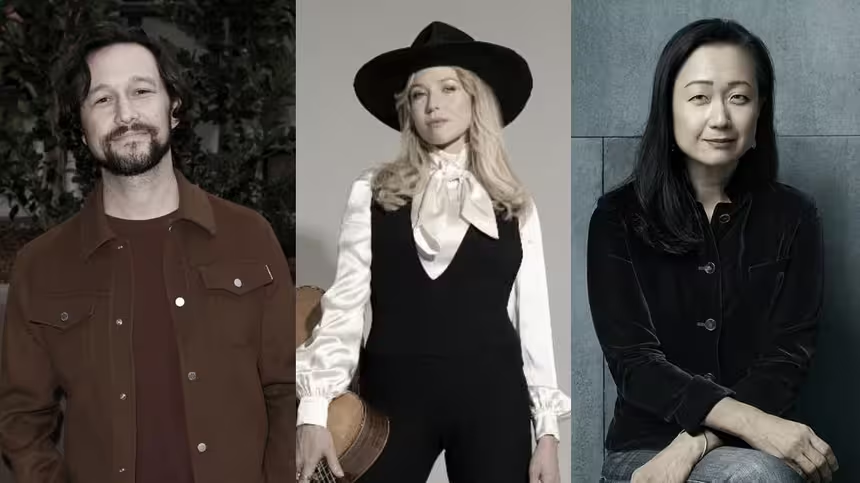
A front row seat to the creative process
How do today’s masters create their art? Each episode an artist reveals how they brought their creative work to life. Hear from artists across disciplines, like actor Joseph Gordon-Levitt, singer-songwriter Jewel, author Min Jin Lee, and more on our podcast "American Masters: Creative Spark."Providing Support for PBS.org
Learn Moreabout PBS online sponsorship- [Announcer] "Firing Line" with William F. Buckley, Junior.
- Isn't it true that certain jokes, at least what were considered jokes 10, 20 years ago, are now un-sayable as a result of certain tensions that exist?
For instance, certain racial jokes.
You couldn't have a minstrel show now, could you, in Hollywood?
- No.
- Do you regret this?
- Well, I like minstrel shows because I was brought up in that era, but I think it's wrong today.
I think the colored people have such a struggle today and I don't think there should be any jokes connected with them.
- Well, but then, shouldn't it also be said that there oughtn't to have been Irish jokes, back when they were having a terrible time and dying like flies in 'Nam.
There shouldn't have been Jewish jokes when they were fighting their way out of the ghettos and so on, so forth?
- I still resent Jewish jokes.
- Give me your- - Publicly.
- Do you?
- And Irish jokes and Catholic jokes and all kinds of jokes.
- [William] Did you ever tell Jewish jokes yourself?
- I never said a Jewish word on the stage in 50 years.
- [William] I didn't say a Jewish word, I said a Jewish joke.
- No.
I might tell you one when the show's over, but I never tell 'em publicly.
- This is what- - I don't regard myself- - I wanna hear.
- as a Jew when I'm publicly performing.
I'm an actor, maybe a bad one, but I'm an actor.
- In other words, out of a sense of deference to people who would not consider them funny, you wouldn't say them to a general audience?
You would only say them to somebody who's- - Who I liked and knew.
- Actively tested and knew.
- And would understand it.
- Yeah.
- I resent Myron Cohen and that long farrago of Jewish jokes.
I think the Jews should have a dignity now the same as the Catholics and the Protestants.
- Well, but is- - I must tell you- - No, but wait a minute.
I don't wanna get off this, because isn't it a sense- - I knew eventually you were gonna make this serious.
We were having fun before.
Why don't you keep it that way?
- Tell me if it begins to hurt.
- No, it never hurts.
I'm proud of being a Jew, particularly- - No, no, no.
- Week before last.
(audience laughs) How do you feel, judge?
- So do I.
- You have no animosity towards we people, do you?
- No.
- Isn't he a charmer?
(everyone laughing) - A lot of modern poetry, one doesn't really follow in any narrative sense, does one?
- Well, they probably could follow my hand gestures and my eye face gestures.
You were very responsive, that was nice.
- Yeah.
- It's good.
- I enjoy it, I think it's very beautiful.
Now are you suggesting that the- because you took that while under LSD you were able to do it?
- Well, it's- No, I think it could be, it's a natural thing.
I cited Blake and Wordsworth as having that natural vision.
I think the LSD thing is not an unnatural vision, as evidenced by the particular details, like sheep speckle the mountain side, revolving (indistinct).
- That you recognized.
- That you recognized.
There are human things that, you know, like everybody has seen in nature.
I think the LSD clarified my mind and left it open to get that sense of giant, vast consciousness.
Specifically, the one thing I noticed, which I was trying to describe, was that the ocean of heaven, the atmosphere is like an ocean, and at the bottom of that ocean of air, there are all sorts of rivulets of winds, breezes, and that those rivulets, like at the bottom of a fish tank move all the trees, move the people around, the hair, the beards, the grass, the lamb's wool, rain beaded in the grass.
So that it's like one system like one giant being breathing.
One giant breathing being that we all are part of, in which we always forget that we are together, the god like of the universe.
- You say together, but you're fond sometimes of saying that it's not really together, that's you as individual who is god, or anyone who discovers his consciousness.
- Going back to that first question you asked, like are the hippies the new order, I think the primary hippie and beatnik originally, back 56, Cadillac, boroughs, perception was a recognition of that unity of being, and recognition of that great consciousness which we all were identical with, see?
And that's what I think is the meaning of that flower power and you know, like make love, not war.
Ultimately, it's like it's grounded in an understanding of the nature of the universe in that you can't fight us, we can't fight us.
That force finally is you know like, at least at this level of civilization, is just like a mess and it's not gonna resolve the problem, and the problem is seeing our unity, particularly black and white, particularly square and hippie, particularly police and student, particularly Birchite and (beep) individualist.
(laughs) - One thing, I don't think that the vote is as a pure expression of the people at any given time anyway.
The vote is much too crude an instrument to measure what real feelings are in the country.
Moreover, politics is extraordinarily complex and dialectical and contradictory.
For example, Nixon could get in and get in on a pro-war policy and be the man to make the peace, precisely because he's a Republican and that's only a theory of mine that it's the Democrats that start the wars and the Republicans who finish them.
Maybe because the Democrats always have to prove that they're not Communists, so they always have to be very militant against the Communists.
The Republicans don't have to prove that, so they can make peace with the Communists.
If you look at the last few wars, that's how they've gone.
- You regret that?
- No, I think it's part of the pleasurable comedy of politics as you can see.
I don't take politicians seriously except as adventurers.
I think they are splendid fellas as adventurers and I admire many of their qualities.
I admire their ability to move from idea to idea and bed to bed.
At that, they're exceptional.
- Well, you say that the Democrats are always feeling the necessity to prove that they're not Communists, but are you glad that they're not Communists?
- Am I glad they're not Communists?
- Yeah.
- All right, listen.
I detest Communism.
I detest it much more than you do, 'cause I know much more about it.
I mean, I've read (indistinct), I've read Marx.
You know, studied it, I spent three months studying it.
I love Marx, you see, I just detest Communism 'cause it betrayed Marx.
It's the way you might detest some awful Christian sect that had completely betrayed Christ, you know.
(audience laughs) - I certainly understand what you're talking about.
It is, of course, true that the typical Communist who lives, let's say on the other side of the Iron Curtain, would be much less frightened by our Naylor administration than say by Buckley administration.
- No, I think they could comprehend- - At least as far as they are concerned, I think they would probably consider the people I support as more irrelevant than anti-Communism people you support.
The last time you were heard of on the political ramparts was on a committee on being friends to Castro, a fair play for Castro committee or whatever.
- I still am all for Castro.
I think he's a remarkable man.
Let me just say that I think that the Communists would probably, well I can't pretend they would ever be the least bit happy with you, they would feel a certain security, which is they would feel they would have somebody, which I might be about to do next, they couldn't ever feel that with me.
I love the way we treat each other as world leaders.
You see, I'm not the only narcissist in that.
- You always told me to respect your metaphors, which I was doing.
- I'm glad that we're beginning to find some conjunction of discourse.
I'm beginning to, well, let it go at that.
See, I like to keep a certain freedom, a certain liberty, to look at the lineaments of major figures.
For instance, just until the strike started in France as of a week ago, I was thinking I thought the two greatest political figures in the world today were Fidel Castro and Charles de Gaulle.
Now I think I may still be able to say that a week from now, 'cause I think, so far I think de Gaulle's been acting sorta- I think he's the world's greatest living conservative.
I think he's a remarkable man.
I'm tremendously fond of him.
I have great respect for him.
I have great respect for Castro.
The point is that, men's, you know, it's the way you wouldn't want one to have great respect for saints and generals, for criminals and cops.
You know, there's such a thing as a great cop, such a thing as a great criminal.
And the way I work, it's very hard to explain this to people, but I don't think in categories, I think rather- I try to think this way, that the world is better off if every so-called type in the world is better.
There's a better world when the cops get better and the criminals get better.
It's a poorer world when the cops are dull and the criminals are dull.
- In one of his essays, Mr. Chomsky writes quote, "By accepting the presumption of legitimacy of debate "on certain issues, such as this one, "one has already lost one's humanity."
I should like to begin by asking him why, under the circumstances, if by being here he stands to lose his humanity, he consented to appear in the first place.
- Because, first of all, I didn't quite put it in those terms, I don't think.
I think that by- - You were overheard.
- Yeah, but I think that, I said that there are certain issues, for example Auschwitz, such that by consenting to discuss them, one degrades oneself and to some degree loses one's humanity, and I think that that's true.
Nevertheless, I can easily imagine circumstances in which I would've been glad to debate Auschwitz.
For example, if there were some chance that by debating Auschwitz it might've been possible to eliminate it or to at least mitigate the horror that was going on.
And I think I feel the same way about Vietnam.
And I really think that there is no, fundamentally there is no argument anymore at an intellectual level, in my opinion.
But I think it's very important to discuss it, nevertheless.
- At what level is there an argument?
- Well, there- There is a policy, which I think is a destructive and devastating policy, it's continuing.
And the continuation of the policy is, to some extent, based on the fact of public apathy or public acceptance.
Hence there still is the necessity to convince people that they should act strongly to put an end to this policy.
- At what point was there an intellectual argument?
At which point did an intellectual argument in favor of our intervening in Vietnam cease to exist?
- Well as I say there, I think that there may have been a time when there was something to debate.
For example, I think that in the middle fifties, though I was opposed to the policy and I think that it was right to be opposed to it, nevertheless I think it was a debatable issue in a sense in which it is no longer a debatable issue.
- Why is that?
- Because at the moment, I think it's really an issue of the survival of the existence of Vietnam as an entity, as a social and cultural entity.
I think that's what's at stake.
- But even that could be intellectually argued, couldn't it?
- Well, in the same sense in which Auschwitz could be intellectually argued.
- No, I mean in a different sense.
- No I think in the same sense.
In fact, don't forget there were people who argued in favor of Auschwitz.
- No, no, I haven't forgotten that at all.
I haven't had any such on this program, nor do I intend to.
But it seems to me that even if what you said were correct, there could be a perfectly legitimate argument over, for instance, the continuation of the state of Anguilla, or the continuation of the state of Gafra, or the continuation of the state of Goa.
- I didn't talk about the existence of the state, I talked about the existence of the society as a social and cultural entity.
I think that's what's at stake.
- Okay, well if it's a stake, mightn't there be two points of view about how to help it evolve into its natural forms, right?
- Oh there are many different points of view.
I think they're very legitimate.
- Well, I can see- - They're very legitimate.
See, they're very legitimate issues that can be argued as to how the United States ought to most efficaciously put an end to its destructive actions in Vietnam.
There are many different alternatives that might be thought about.
- Yes, the one way of course to put an end to America's necessary intervention is to conclude the war successfully.
That's a way.
- No, one possible way is by destroying Vietnam, which I think probably the most likely outcome.
- You disagreed very strongly with Dick Gregory, whom had indicated that the militant stance and symbolism and rhetoric functionally could actually displace violence.
If you see what I mean?
Perhaps, could you accept that as a phenomena of a positive- - Yes.
- good that the Panthers have contributed?
- Yes, I could.
Unfortunately, as much could be said of the Ku Klux Klan.
But it is true- - I think that- - Dick Gregory gave a concrete example, you may not remember, about a black woman who felt intimidated.
This is about two or three years ago, and she called the Black Panther headquarters there and they sent someone to look out for her and he was armed.
On the basis of the assurance that she got from his presence, she did calm down and recovered her stability.
And there's no question that people can't form that kind of a function, armed in that kind of a way, and I have no doubt that the leader of the Black Panthers did it.
- I would like to say this, and I'm sorry if I interrupt.
When people equate the Black Panther party with such people as the Ku Klux Klan and White Citizens Council, I get sort of upset.
I agree that I would like to see a world, and we agree on more points than we probably have time to realize now, but the point that dialog- dialectical struggle, I struggle just through the word.
I would hope that that will probably be the next advance as bad will come through and put the club down.
But I think that there's certain objective kind of difficulties have reached that point immediately.
I think that things just don't happen, you start, but as long as there's especially an economic interest, one has to support authority that he has to support, then he creates a rhetoric in order to sell that to a group, to an army, to henchmen, then I think that this kind of dialogue will be inflammatory and cause much violence and so forth.
And I will even point out the history of the Black Panther party, I think the rhetoric ran amuck with the leadership, the influence is clearer and it caused many murders, that it laid the foundation so that even the black community could say oh those bad guys out there.
You see they only want violence and robbers and so forth.
This kind of rhetoric, I think, can promote physical conflict that dialogue itself carries no sort of virtue unless it's pointed into a direction in order to resolve a problem, you see?
(gentle music)
Buckley's Yale criticism fueled the conservative movement
Video has Closed Captions
Clip: 4/5/2024 | 1m 47s | Yale administration feared Buckley's outspoken criticism of the university. (1m 47s)
Exclusive Preview: Who was William F. Buckley, Jr.?
Video has Closed Captions
Clip: 4/5/2024 | 10m 12s | Watch the first ten minutes of The Incomparable Mr. Buckley in this sneak preview. (10m 12s)
Video has Closed Captions
Preview: 4/5/2024 | 2m 31s | Discover the intellectual evolution and political legacy of William F. Buckley, Jr. (2m 31s)
The Incomparable Mr. Buckley (AD + ASL + OC Trailer)
Clip: 4/5/2024 | 2m 47s | Discover the intellectual evolution and political legacy of William F. Buckley, Jr. (2m 47s)
When William F. Buckley, Jr. ran for mayor of New York City
Video has Closed Captions
Clip: 4/5/2024 | 2m 56s | William F. Buckley, Jr. ran for mayor of New York City under the Conservative Party. (2m 56s)
William F. Buckley, Jr.'s relationship with wife Patricia
Video has Closed Captions
Clip: 4/5/2024 | 2m 5s | William F. Buckley, Jr. and his wife Patricia had a brazen, but loving relationship. (2m 5s)
Providing Support for PBS.org
Learn Moreabout PBS online sponsorshipSupport for PBS provided by:
Support for American Masters is provided by the Corporation for Public Broadcasting, AARP, Rosalind P. Walter Foundation, Judith and Burton Resnick, Blanche and Hayward Cirker Charitable Lead Annuity Trust, Koo...

